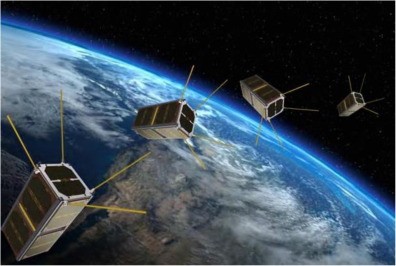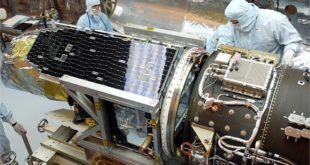Marine transport Marine transport stands as the cornerstone of global trade, facilitating approximately 90% of merchandise trade via sea routes due to its unparalleled cost-effectiveness. At the heart of marine transport lies marine propulsion systems, which propel ships through water, ensuring safety standards for marine ecosystems while remaining economically viable. According …
Read More »Pioneering the Depths: Innovations in Underwater Power and Propulsion Systems for Long-Duration Missions
The vast underwater world holds endless possibilities for exploration and discovery. But one major hurdle for unmanned underwater vehicles (UUVs) is their limited operational time due to battery constraints. To overcome the limitations of traditional power sources and propulsion systems, researchers and engineers are delving into groundbreaking designs aimed at revolutionizing …
Read More »Revolutionizing Space Security: AI-Enabled Satellite Swarms
As our reliance on satellite technology continues to grow, ensuring the security of these vital space assets has become increasingly crucial. Traditional space-based systems, often characterized by single, large satellites, are giving way to more advanced and flexible configurations. One groundbreaking advancement is the integration of artificial intelligence (AI) with …
Read More »Satellite Swarms and Formation Flying: Revolutionizing Space Missions
The increasing capabilities of Micro, Nano, and CubeSats, coupled with their short development times and reduced launch costs, are revolutionizing Earth observation missions. These small satellite missions are increasingly favored over traditional large satellites, offering flexibility and cost-effectiveness. Two primary topologies are Satellite Constellations and Satellite Formation Flying. In the …
Read More »Outsmarting the Honey Trap: Technology’s Role in Counterintelligence
The world of espionage is filled with intrigue and deception, and one method that’s been around for centuries is honey trapping. This tactic involves using romantic or sexual relationships to gain access to sensitive information. But in today’s tech-driven world, even spies are facing a new challenge: counterintelligence powered by …
Read More »Exploring the Wonders of Supersolid Materials: Properties and Applications
Introduction: In the realm of materials science, there exists a class of extraordinary substances known as supersolids. These materials possess unique properties that defy conventional understanding, opening doors to a myriad of potential applications across various industries. From their intriguing quantum mechanical behaviors to their practical uses in technology, supersolid …
Read More »High-Volume Satellite Production: Transforming Space with Microsatellite and Nanosatellite Constellations
The rapid evolution of satellite technology is ushering in a new era of space exploration and communication. Driven by substantial commercial and military interest, the focus has shifted towards high-volume production of microsatellites and nanosatellites. These small, agile satellites are not only cost-effective but also offer remarkable versatility for a …
Read More »Riding the Signal Wave: Advanced Modulation for Next-Gen LEO Satellite Constellations
In the realm of modern connectivity, few technologies rival the reach and flexibility of satellite communications. Unlike terrestrial networks, which are often constrained by geographical limitations, satellite systems have the unique ability to cover the entire globe, bringing connectivity to even the most remote and underserved regions. Moreover, with the …
Read More »NCSC Assessment: Evaluating the Impact of Artificial Intelligence on Cyber Threats
As the digital landscape continues to evolve, the intersection of artificial intelligence (AI) and cybersecurity emerges as a focal point for policymakers and security experts alike. The National Cyber Security Centre (NCSC) Assessment (NCSC-A) provides invaluable insights into the evolving cyber threat landscape, particularly concerning the potential impact of AI …
Read More »Multiple Access and Routing for LEO Satellite Constellations: Unlocking Efficient Communication
The advent of Low Earth Orbit (LEO) satellite constellations has revolutionized the satellite communication landscape, offering unprecedented global coverage, low latency, and high-speed data transfer. Central to the success of these constellations are the sophisticated techniques of multiple access and routing. This article delves into the intricacies of these mechanisms …
Read More » International Defense Security & Technology Your trusted Source for News, Research and Analysis
International Defense Security & Technology Your trusted Source for News, Research and Analysis

